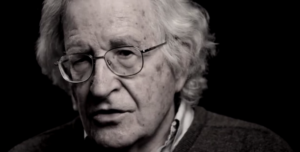Chomsky: Peace Talks In Ukraine “Will Get Nowhere” If US Keeps Refusing To Join
As Russia steps up its assault on Ukraine and its forces advance on Kyiv, peace talks between the two sides were scheduled to resume today for the fourth time, but have now been postponed until tomorrow. Unfortunately, some opportunities for a peace agreement have already been squandered, so it’s hard to be optimistic about when the war will end. Regardless of when or how the war ends, though, its impact is already being felt across the international security system, as the rearmament of Europe shows. The Russian invasion of Ukraine also complicates the urgent fight against the climate crisis. The war takes a heavy toll on Ukraine and on the environment, but it also gives the fossil fuel industry extra leverage among governments.
In the interview that follows, world-renowned scholar and dissident Noam Chomsky shares his insights about the prospects for peace in Ukraine and how this war may impact our efforts to combat global warming.
Noam Chomsky, who is internationally recognized as one of the most important intellectuals alive, is the author of some 150 books and the recipient of scores of highly prestigious awards, including the Sydney Peace Prize and the Kyoto Prize (Japan’s equivalent of the Nobel Prize), and of dozens of honorary doctorate degrees from the world’s most renowned universities. Chomsky is Institute Professor Emeritus at MIT and currently Laureate Professor at the University of Arizona.
C.J. Polychroniou: Noam, while a fourth round of negotiations was scheduled to take place today between Russian and Ukrainian representatives, it is now postponed until tomorrow, and it still seems unlikely that peace will be reached in Ukraine any time soon. Ukrainians don’t appear likely to surrender, and Putin seems determined to continue his invasion. In that context, what do you think of Ukrainian President Volodymyr Zelensky’s response to Vladimir Putin’s four core demands, which were (a) cease military action, (b) acknowledge Crimea as Russian territory, (c) amend the Ukrainian constitution to enshrine neutrality, and (d) recognize the separatist republics in eastern Ukraine?
Noam Chomsky: Before responding, I would like to stress the crucial issue that must be in the forefront of all discussions of this terrible tragedy: We must find a way to bring this war to an end before it escalates, possibly to utter devastation of Ukraine and unimaginable catastrophe beyond. The only way is a negotiated settlement. Like it or not, this must provide some kind of escape hatch for Putin, or the worst will happen. Not victory, but an escape hatch. These concerns must be uppermost in our minds.
I don’t think that Zelensky should have simply accepted Putin’s demands. I think his public response on March 7 was judicious and appropriate.
In these remarks, Zelensky recognized that joining NATO is not an option for Ukraine. He also insisted, rightly, that the opinions of people in the Donbas region, now occupied by Russia, should be a critical factor in determining some form of settlement. He is, in short, reiterating what would very likely have been a path for preventing this tragedy — though we cannot know, because the U.S. refused to try.
As has been understood for a long time, decades in fact, for Ukraine to join NATO would be rather like Mexico joining a China-run military alliance, hosting joint maneuvers with the Chinese army and maintaining weapons aimed at Washington. To insist on Mexico’s sovereign right to do so would surpass idiocy (and, fortunately, no one brings this up). Washington’s insistence on Ukraine’s sovereign right to join NATO is even worse, since it sets up an insurmountable barrier to a peaceful resolution of a crisis that is already a shocking crime and will soon become much worse unless resolved — by the negotiations that Washington refuses to join.
That’s quite apart from the comical spectacle of the posturing about sovereignty by the world’s leader in brazen contempt for the doctrine, ridiculed all over the Global South though the U.S. and the West in general maintain their impressive discipline and take the posturing seriously, or at least pretend to do so.
Zelensky’s proposals considerably narrow the gap with Putin’s demands and provide an opportunity to carry forward the diplomatic initiatives that have been undertaken by France and Germany, with limited Chinese support. Negotiations might succeed or might fail. The only way to find out is to try. Of course, negotiations will get nowhere if the U.S. persists in its adamant refusal to join, backed by the virtually united commissariat, and if the press continues to insist that the public remain in the dark by refusing even to report Zelensky’s proposals.
In fairness, I should add that on March 13, the New York Times did publish a call for diplomacy that would carry forward the “virtual summit” of France-Germany-China, while offering Putin an “offramp,” distasteful as that is. The article was written by Wang Huiyao, president of a Beijing nongovernmental think tank.
It also seems to me that, in some quarters, peace in Ukraine is hardly on top of the agenda. For example, there are plenty of voices both in the U.S. and in U.K. urging Ukraine to keep on fighting (although western governments have ruled out sending troops to defend Ukraine), probably in the hopes that the continuation of the war, in conjunction with the economic sanctions, may lead to regime change in Moscow. Yet, isn’t it the case that even if Putin actually falls from power, it would still be necessary to negotiate a peace treaty with whatever Russia government comes next, and that compromises would have to be made for the withdrawal of Russian forces from Ukraine?
We can only speculate about the reasons for U.S.-U.K. total concentration on warlike and punitive measures, and refusal to join in the one sensible approach to ending the tragedy. Perhaps it is based on hope for regime change. If so, it is both criminal and foolish. Criminal because it perpetuates the vicious war and cuts off hope for ending the horrors, foolish because it is quite likely that if Putin is overthrown someone even worse will take over. That has been a consistent pattern in elimination of leadership in criminal organizations for many years, matters discussed very convincingly by Andrew Cockburn.
And at best, as you say, it would leave the problem of settlement where it stands.
Another possibility is that Washington is satisfied with how the conflict is proceeding. As we have discussed, in his criminal foolishness, Putin provided Washington with an enormous gift: firmly establishing the U.S.-run Atlanticist framework for Europe and cutting off the option of an independent “European common home,” a long-standing issue in world affairs as far back as the origin of the Cold War. I personally am reluctant to go as far as the highly knowledgeable sources we discussed earlier who conclude that Washington planned this outcome, but it’s clear enough that it has eventuated. And, possibly, Washington planners see no reason to act to change what is underway.
It is worth noticing that most of the world is keeping apart from the awful spectacle underway in Europe. One telling illustration is sanctions. Political analyst John Whitbeck has produced a map of sanctions against Russia: the U.S. and the rest of the Anglosphere, Europe and some of East Asia. None in the Global South, which is watching, bemused, as Europe reverts to its traditional pastime of mutual slaughter while relentlessly pursuing its vocation of destroying whatever else it chooses to within its reach: Yemen, Palestine, and far more. Voices in the Global South condemn Putin’s brutal crime, but do not conceal the supreme hypocrisy of western posturing about crimes that are a bare fraction of their own regular practices, right to the present.
Russia’s invasion of Ukraine may very well change the global order, especially with the likely emergence of the militarization of the European Union. What does the change in Germany’s Russia strategy — i.e., its rearmament and the apparent end of Ostpolitik — mean for Europe and global diplomacy?
The major effect, I suspect, will be what I mentioned: more firm imposition of the U.S.-run, NATO-based Atlanticist model and curtailing once again the repeated efforts to create a European system independent of the U.S., a “third force” in world affairs, as it was sometimes called. That has been a fundamental issue since the end of World War II. Putin has settled it for the time being by providing Washington with its fondest wish: a Europe so subservient that an Italian university tried to ban a series of lectures on Dostoyevsky, to take just one of many egregious examples of how Europeans are making fools of themselves.
Meanwhile, it seems likely that Russia will drift further into China’s orbit, becoming even more of a declining kleptocratic raw materials producer than it is now. China is likely to persist in its programs of incorporating more and more of the world into the development-and-investment system based on the Belt-and-Road initiative, the “maritime silk road” that passes through the UAE into the Middle East, and the Shanghai Cooperation Organization. The U.S. seems intent on responding with its comparative advantage: force. Right now, that includes Biden’s programs of “encirclement” of China by military bases and alliances, while perhaps even seeking to improve the U.S. economy as long as it is framed as competing with China. Just what we are observing now.
There is a brief period in which course corrections remain possible. It may soon come to an end as U.S. democracy, such as it still is, continues on its self-destructive course.
Russia’s invasion of Ukraine may also have dealt a severe blow to our hopes of tackling the climate crisis, at least in this decade. Do you have any comments to make on this rather bleak observation of mine?
Appropriate comments surpass my limited literary skills. The blow is not only severe, but it may also be terminal for organized human life on earth, and for the innumerable other species that we are in the process of destroying with abandon.
In the midst of the Ukraine crisis, the IPCC released its 2022 report, by far the most dire warning it has yet produced. The report made it very clear that we must take firm measures now, with no delay, to cut back the use of fossil fuels and to move toward renewable energy. The warnings received brief notice, and then our strange species returned to devoting scarce resources to destruction and rapidly increasing its poisoning of the atmosphere, while blocking efforts for extricating itself from its suicidal path.
The fossil fuel industry can scarcely suppress its joy in the new opportunities the invasion has provided to accelerate its destruction of life on earth. In the U.S., the denialist party, which has successfully blocked Biden’s limited efforts to deal with the existential crisis, is likely to be back in power soon, so that it can resume the dedication of the Trump administration to destroy everything as quickly and effectively as possible.
These words might sound harsh. They are not harsh enough.
The game is not over. There still is time for radical course correction. The means are understood. If the will is there, it is possible to avert catastrophe and to move on to a much better world. The invasion of Ukraine has indeed been a severe blow to these prospects. Whether it constitutes a terminal blow or not is for us to decide.
Copyright © Truthout. May not be reprinted without permission.
C.J. Polychroniou is a political scientist/political economist, author, and journalist who has taught and worked in numerous universities and research centers in Europe and the United States. Currently, his main research interests are in U.S. politics and the political economy of the United States, European economic integration, globalization, climate change and environmental economics, and the deconstruction of neoliberalism’s politico-economic project. He is a regular contributor to Truthout as well as a member of Truthout’s Public Intellectual Project. He has published scores of books and over 1,000 articles which have appeared in a variety of journals, magazines, newspapers and popular news websites. Many of his publications have been translated into a multitude of different languages, including Arabic, Chinese, Croatian, Dutch, French, German, Greek, Italian, Japanese, Portuguese, Russian, Spanish and Turkish. His latest books are Optimism Over Despair: Noam Chomsky On Capitalism, Empire, and Social Change (2017); Climate Crisis and the Global Green New Deal: The Political Economy of Saving the Planet (with Noam Chomsky and Robert Pollin as primary authors, 2020); The Precipice: Neoliberalism, the Pandemic, and the Urgent Need for Radical Change (an anthology of interviews with Noam Chomsky, 2021); and Economics and the Left: Interviews with Progressive Economists (2021).





